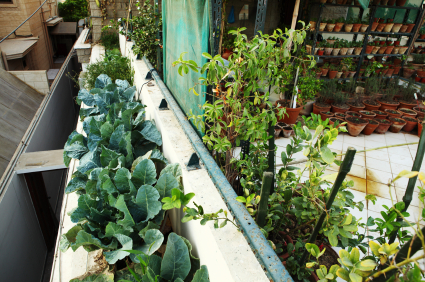 Just because you live in an apartment, does not mean you have to live without the joys of fresh, homegrown garden vegetables. There are just a few simple steps that can help you achieve your homegrown produce dream.
Just because you live in an apartment, does not mean you have to live without the joys of fresh, homegrown garden vegetables. There are just a few simple steps that can help you achieve your homegrown produce dream.
The first thing that you need to do is to consider your growing conditions. Ask yourself what is the availability of sunlight? It is a good idea to spend a few days watching the sunlight pattern on your patio, deck, or balcony. The amount of sunlight directly affects which plants you can grow successfully.
The second step is to assess your space. If you have a small space, then you have to think outside of the box in terms of how to make them more efficient use of your space. Not only can you set plants on a sunny patio, but you can also use vertical space as well. Many urban gardens use trellises or garden netting to support vining plants like tomatoes, berries, squash, and beans. Moreover, you can also use topsy turvys or fashion one from a 5-gallon bucket. Urban gardeners also screw in rain gutters to create small, uniformed beds. This is a great way of growing lettuce, spinach or strawberries!
The third step is finding the right types of seeds. Ideally, you want to make the most of your urban garden investment and use open-pollinated seeds. We like the seeds at Ready Gardens because they are sourced in America and have a track record for their performance.
Growing small plants with smaller root systems is another way to deal with small spaces. It would not be a good idea to plant corn or other large plants. Most importantly, make the best use of your space! Use the underutilized space on walls to grow vegetables and fruits. And hanging planters could also make good use of a small patio. Strawberries, cherry tomatoes or dwarf pepper plants would thrive well in a hanging basket. The following is a listing of plants that grow well in containers:
- Tomatoes (you will have to provide support for their stalks)
- Peppers (you will have to provide support for their stalks)
- Lettuce
- Cabbage
- Mustard greens
- Carrots
- Turnips
- Onions
- Garlic
- Radishes
- Potatoes
- Most herbs
The final step is to purchase good dirt. I prefer a mix of five different types of compost, e.g., worm compost, cow manure, mushroom compost, vegetable, and fruit compost, etc., vermiculite, and peat moss. If it is good enough for Mel Bartholomew, the inventor of square-foot gardening, then it is good enough for me.
Never Underestimate the Power of Recycled Materials
Using recycled materials in your garden is a great way to repurpose items you already have on hand. For instance, you poke small holes in a water bottle and plant it along with vegetables. Fill the water bottle with water and it will slowly seep water out of the holes giving your plants ready access to water. You can also use soda bottles to make a topsy turvy container for plants.
To conclude, just because you live in a city or in a small apartment doesn’t mean you can’t try your hand at gardening. Look into how you can create a garden to produce your own sustainability.

Square Foot Gardening is the most effective and easy way to garden in small spaces, not only does it use 20% of the space a traditional garden uses, it also saves water and time spent digging and weeding. For more information on SFG please visit our web site http://www.squarefootgardening.com/
Happy Gardening Everyone!